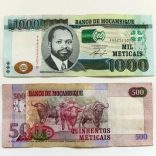Mozambique: Government to spend over 300 million dollars on servicing domestic public debt - AIM ...
Mozambique: Food inflation exceeds 10%; should have been reference for wages – economist

FILE - Illustrative photo. [File photo: Lusa]
Mozambican economist Estrela Charles has pointed out that annual food-price inflation has exceeded 10% in the country recently, adding that that figure should have been the reference in fixing the new minimum wages instead of average annual inflation, which stood at around 7%.
“Food inflation is between 10% and 11%, and the minimum wage has increased between 3% and 4%, which means that it is far below what it needed to be to at least cover the rise in food prices,” the economist and researcher at the Centre for Public Integrity (CIP) told Lusa.
Estrela Charles says that the criterion that guided the approval of the new salaries at the beginning of this year was accumulated annual inflation, which stood between 6% and 6.7% and which included all the products in a consumer’s basic basket. However, the rise in food prices is above 10%, she explained.
Charles stressed that the increases in lower wages decided earlier this month do not restore workers’ purchasing power, pointing to the rise of 371 meticais (€5.50) in one low-paid sector, which does not “keep up with”, for example, the recent more-than 500 meticais (€7.40) increase in the price of rice and cooking oil.
ALSO READ: Mozambique: New minimum wages increase between 190 and 931.67 meticais – Carta
Charles stressed that the situation of workers is even more precarious given that they have forgone salary increases for the last two years, during the economic downturn caused by the Covid-19 pandemic, the impact of climate change and armed violence in the province of Cabo.
The government and companies, she proceeded, are in a position to increase minimum wages, because the economy is coming out of the two-year recession, something evidenced, according to Charles, in the increase in job vacancies.
Charles accuses the executive and employers of a “lack of interest” in paying better minimum wages and strengthening the purchasing power of workers. “Employers will always tend to set lower and lower wages in order to make higher profits,” she said.
Charles also says that the government is reluctant to approve substantial minimum wages increases because several members of the executive are also employers.
“A good part of the business sector in the country is made up of members of the government. There is a conflict of interest, and the workers are isolated in the negotiation process,” she said.
“The fact that the trade unions have demanded a minimum wage of 30,000 meticais [€446.00] and the government has set the lowest salary paid in the country at just over 5,000 meticais [€74.30] shows that workers’ representatives were forced into this consensus, because the difference is around 25,000 meticais [€371.0o],” Charles concludes.













Leave a Reply
Be the First to Comment!
You must be logged in to post a comment.
You must be logged in to post a comment.